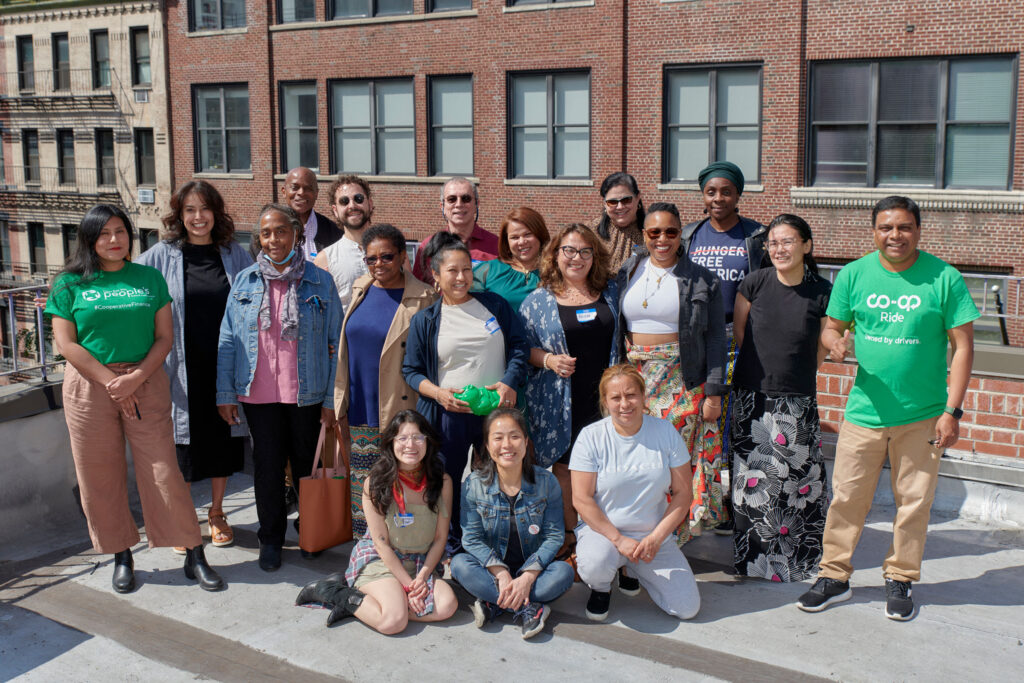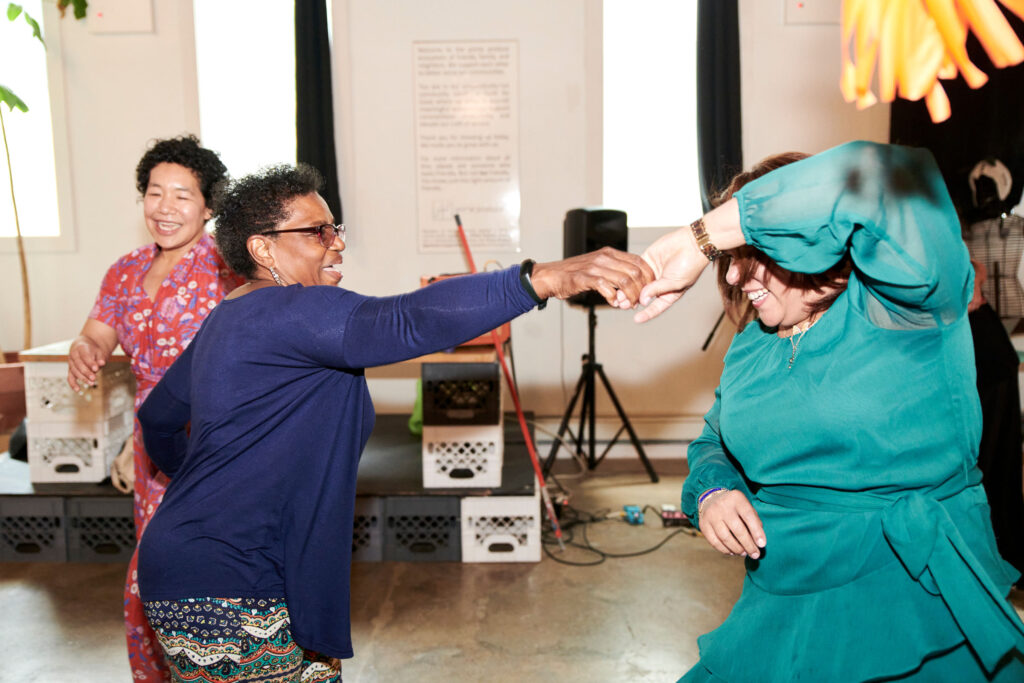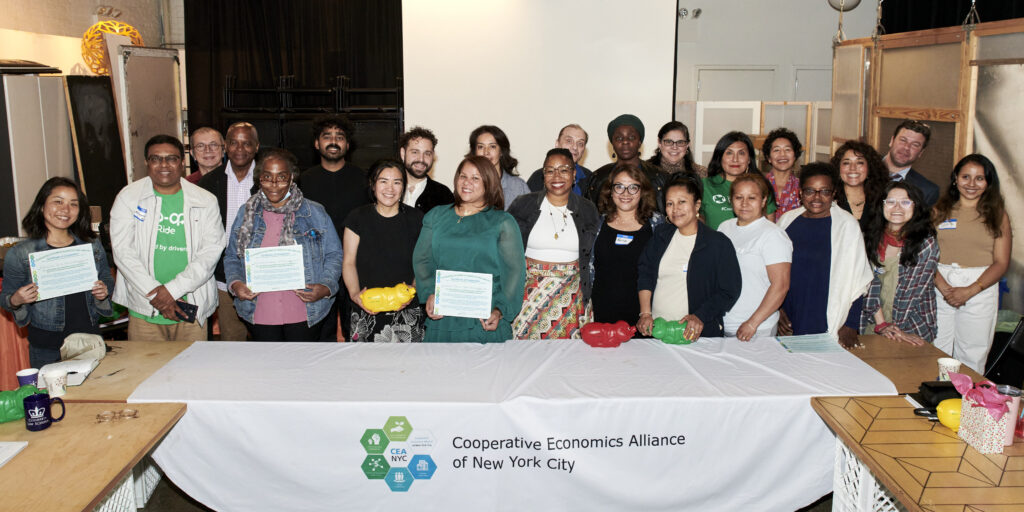
This year’s 2023 CLI cohort – our 4th – has been our most ambitious, bilingual and successful. It included 6 affordable housing co-ops, 5 worker cooperatives, 3 community development credit unions, and an event space co-op – all firsts for the CLI.
But what has did this amazing cohort work on over six months?
- Finding common challenges and solutions for the problems they face
- (Re)grounding their work in cooperative and solidarity economy principles
- Matching group needs to group offers and centering that vast potential for mutual aid within our movement
- Leaders telling the story of their leadership: how we got here and where we’re going. i.e – “Where am I in this movement and where else do I want to be?”
- Planning walking tours in the neighborhoods where these groups are the densest
- Building concrete economic ties and joint purchasing plans between groups

2023 Cooperative Leadership Intensive – Curriculum Outline and Goals
Class 1: Orientation Part 1 – Goals
- Get accustomed to tech, interpretation, and shared tools
- Develop shared expectations about program and participation
- Introduce cohort members
- Introduce CEANYC and its role in NYC’s Solidarity Economy
Class 2: Orientation Part 2 – Goals
- Begin to develop common language and frameworks to discuss the structure and operations of different kinds of SE enterprises.
- Introduce Co-operative Identity, Values, and Principles.
- Analyze the Co-operative Principles in-depth.
- Introduce sectors of Solidarity Economy (labor, food, housing, culture, finance)
- Spotlight the types of enterprises found in the food sector.
Class 3: Power Part 1 – Goals
- Explore positional and situational power
- Analyze how visible, hidden, and invisible power operate within individuals, groups, and various political, social, and economic systems
Class 4: Power Part 2 – Goals
- Identify personal habits and tendencies in handling conflict that impact overall group culture i.e. not wanting to make waves, being aggressive about getting a viewpoint across, protection of the individual over the collective.
- Review strategies to recognize, understand, and self-regulate personal habits of conflict management.
- Explore ways to uphold a culture of safety, respect, and equity in representation of members’ viewpoints enterprise-wide.
- Continue exploring the types of enterprises and practices found in SE.
Class 5: Vision Part 1 – Goals
- Define and demystify the primary characteristics of capitalism .
- Understand why the Solidarity Economy movement is not for reforming or ameliorating capitalism.
- Explore some concrete examples of how Solidarity Economy has been and can be situated within the context of broader social movements and organizing.
Class 6: Vision Part 2 – Goals
- Take concepts from the previous sessions and being to ground them in real-world approaches that are applicable to the groups represented in the cohort
- Prefigure the process of each member of the cohort crafting their own development strategy for their group.
Class 7: Organizing Part 1 – Goals
- Confirm/Affirm awareness across the cohort of how each person involved is plugged into the NYC solidarity economy – What group/model/practices are they each a part of?
- Uncover and understand common challenges across the groups represented in the room.
- Uncover and understand unique challenges within models and industries represented in the room.
- Identify strategic points to intercept challenges at personal, group, and SE-wide levels.
- Ensure that monolingual Spanish and English Speakers are working in groups and talking to each other to not create language segregation.
Class 8: Organizing Part 2 – Goals
- Participants gain a more concrete grasp of the support available to them, and the support they can provide, through the cohort and the local SE
- Ensure that monolingual Spanish and English Speakers are working in groups and talking to each other to not create language segregation.
Class 9: Stewardship Part 1 – Goals
- Ensure that monolingual Spanish and English Speakers are working in groups and talking to each other to not create language segregation.
- Confirm/Affirm awareness across the cohort of how each person involved is plugged into the NYC solidarity economy – What group/model/practices are they each a part of?
- Uncover and understand the experiences and skills each person brings to the group.
- Cohort members see themselves and each other as assets.
- Cohort members practice telling the story of their own leadership.
- Ensure cohort members are aware of and understand the cooperative values and principles.
- Cohort members are able to contextualize their leadership within the cooperative movement.
- Ensure cohort members have concrete tools and an understanding of how to use them in order to secure the participation of other members of their groups in carrying forward and integrating ideas and/or lessons from CLI.
Class 10: Stewardship Part 2 – Goals
- Ensure that monolingual Spanish and English Speakers are working in groups and talking to each other to not create language segregation.
- Follow up on and deepen conversation around economic ties between groups, moving toward concrete commitments to more cooperation among cooperatives.
- Carve out time for a communications primer with guest speaker, Belén.
- Identify where cohort members have energy and enthusiasm to engage in collaborative projects over the long term – this will enable us to create working groups for June.
Class 11: Stewardship Part 3 – Goals
- Ensure that monolingual Spanish and English Speakers are working in groups and talking to each other to not create language segregation.
- Begin a phase of work defining/planning.
- Make sure members have clear roles and to participate in the work they want to see done in the spirit of self-help and self-responsibility.
- Get to clear next steps and dates.
- Coordinate with Ali to clarify CEANYC’s internal capacity to support the outcomes.
- Clarify ways to continue working as a cohort.
Class 12: Stewardship Part 4 – Goals
- Ensure that monolingual Spanish and English Speakers are working in groups and talking to each other to not create language segregation.
- Review what we’ve done for the entirety of CLI.
- Class content
- Self-study of SE models and practices
- Make sure people feel clear about the content and understand ways they can bring it back to their group.
- Celebrate social bonds and time spent together

2023 CLI Cohort
Akiko Ichikawa
GreenHill Food Cooperative – Central Brooklyn
Alicia Portada
Lower East Side People’s Federal Credit Union – Lower East Side, Manhattan / East Harlem, Manhattan / Staten Island / The Bronx
Carrie Sorensen
566 W 159th HDFC – Carrie Sorenson – Washington Heights, Manhattan
Charlotte Bell
Habitat Community Fund – City-wide
Chris Lepre
Bushwick Food Cooperative, Bushwick, Brooklyn
Clara Calvo
Cooperative Homecare Associates – City-wide
Daniela Castillo
El Puente – Williamsburg, Brooklyn
Denise Hernandez
Cooperative Homecare Associates – City-wide
Elizabeth Polanco
Nanny Bee Child Care Coop – Washington Heights, Manhattan
Evelyn Bermeo
Neighborhood Trust Federal Credit Union – Western Harlem, Manhattan
Guillermo Lara
Lenox Court HDFC — East Harlem, Manhattan
Josephine Charles
1007-09 E 174th St HDFC – South/Central Bronx
Karna Ray
Brooklyn Packers – Central/Northern Brooklyn
Kevin Walters
Concord Federal Credit Union – Central Brooklyn
Leonor De Marcos
Brightly East Harlem – East Harlem, Manhattan
Lupe Sánchez
Pleasant Village Community Garden – – East Harlem, Manhattan
Mireya Torres
Brightly East Harlem – East Harlem, Manhattan
Mohammad Hossen
Drivers Cooperative – City-wide
Niani Taylor
East New York Community Land Trust – Brownsville/East New York, Brooklyn
Rae Gomes
Central Brooklyn Food Cooperative – Central Brooklyn
Rosa Franco
Neighborhood Trust Federal Credit Union – Western Harlem, Manhattan
Vernice Walters
Gorman Houses/Phoenix Community Garden – Brownsville, Brooklyn
Yuko Kudo
Prime Produce Apprentice Cooperative – Hell’s Kitchen, Manhattan
